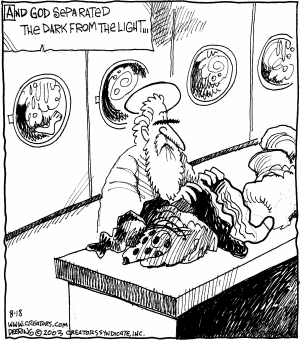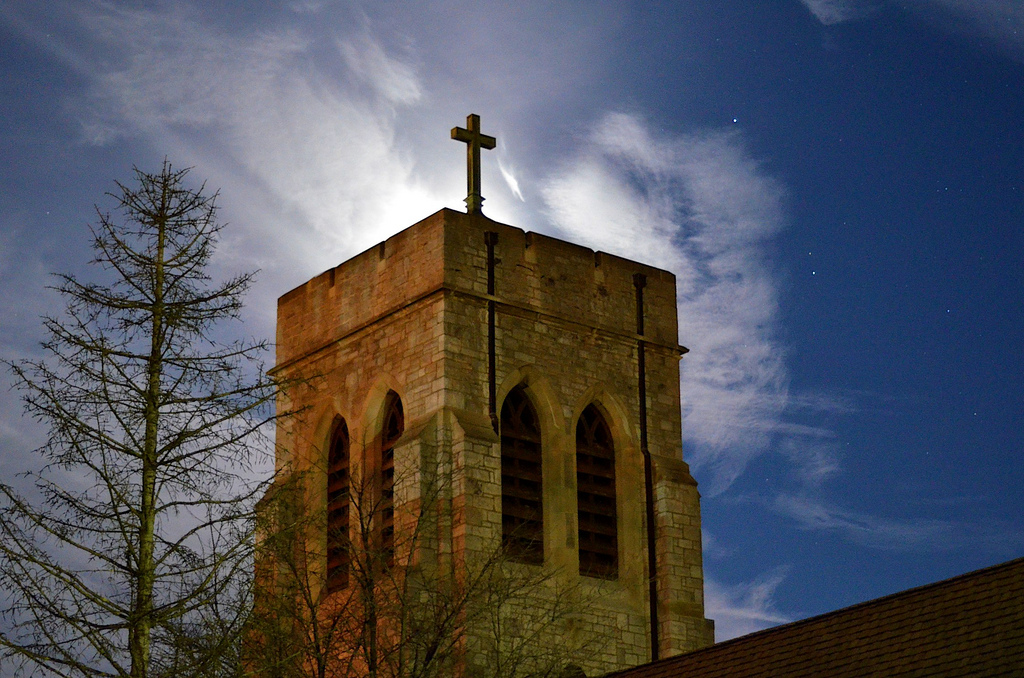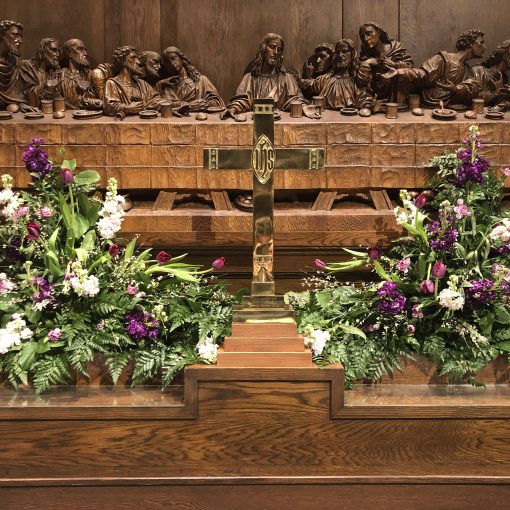Concluding the text of the talk I presented at Cornell on 11 April 2015, “My God, my God, Why Have You Forsaken Me? A Biblical Response to Loss and Catastrophe.” I did not touch much upon NT texts for reasons stated (they related to a difference context than the one most of us find ourselves in. At a future date I will address those texts more directly.
What do we do with our lot?
The biblical view then is that God’s plan was for us to live in harmony with one another, this creation, and most of all with him. We shattered that glass and now we live in a broken world, one in which the righteous and the wicked alike come to the same fate. That is the biblical world-view and it is the only one that makes sense of this world.
We may try and find some pattern or purpose in our suffering as a means of alleviating our pain, but that is not the normal order. I am not suggesting that God may not or could not intervene or guide history even with regard to suffering; clearly I believe he did most emphatically with the sending of his Son to suffer and die for us. But day in and day out the world turns, people get sick, they suffer, they die, we mourn and it happens to all the same.
We do a great injustice to God’s grace and mercy when we try to explain Mack’s death or your sister’s cancer as part of some grand manipulative plan. As we make our way outside of the Garden’s Gates the presence of God is found not in the infliction of our suffering, but in the grace and peace to bear it.
While the biblical view of the world is that it is broken and full of suffering and pain. Vanity, all is vanity! That is not the totality of the biblical world-view. Because when God expelled humanity from the Garden he did not abandon us. He allowed humanity to go their own way, to follow their passions and “The LORD saw that the wickedness of humankind was great in the earth, and that every inclination of the thoughts of their hearts was only evil continually.” (Gen. 6:5) And he stepped in, time and again, he stepped in.
So we find in Scripture words of encouragement and hope as well as models for bearing up under the weight of this world, even while we wait expectantly for the world to come.
I know some of you have been studying the Psalms lately and perhaps have been a bit surprised by the fact that the majority of psalms are what we call psalms of lament. You might have also been surprised by how forthright and even (seemingly) offensive the psalmist can be. These offer models for us when we are struggling and in pain.
When the doctors of the ER decided that Mack needed to be sent to a hospital with greater facilities, they flew him in the Life Lion helicopter to Penn State Hershey Medical Center, a two-hour drive away. Elizabeth and I arrived sometime after midnight. The chaplain met us and took us to a “quiet room.” I had done my “clinical pastoral education” and I knew what that meant. We waited for the doctor to come and officially tell us that Mack had not made it, he had died on the helicopter. At that moment and over the next few hours unbidden to my mind came the opening words of Psalm 22. I actually never said it aloud, though I wanted to scream them, because I didn’t want the minister to think I was “overly dramatic” or some such silly notion. How can we be over dramatic about our child’s death? But consider the words.
1 My God, my God, why have you forsaken me?
Why are you so far from helping me, from the words of my groaning?
2 O my God, I cry by day, but you do not answer;
and by night, but find no rest.
3 Yet you are holy,
enthroned on the praises of Israel.
4 In you our ancestors trusted;
they trusted, and you delivered them.
5 To you they cried, and were saved;
in you they trusted, and were not put to shame.
One of the most powerful things the psalms provide for us is the permission to be honest with God, to speak openly of our grief and pain. It is surprising how often I have heard and read of Christians advising other Christians that we are to “suffer in silence” all that God sends upon us. Certainly the psalmist did not! (Elements: Address or Cry; Lament; Confession of trust; Invocation – do this!; Vow or Praise)
So our response to hardship and grief does not need to be pious silence, but outrage and anger is acceptable! God is big enough; he can handle our frustration and bitterness. Most importantly of all, God wants us to be honest with him, he wants all of us including our pain.
Of course it is not healthy or helpful for us to live in that moment either. Just as Qohelet could not remain long in his Gedankenexperiment we too should not remain long in our period of anger. If you follow a psalm of lament, you find that the psalmist also comes around to statements of God’s faithfulness and his trust in God. This is all compacted into a single poem, yet in our own lives it may be stretched out for days or months.
While the biblical reality is that this is a broken world in which we all will suffer, the biblical promise is that this world is not the entirety of reality.
The prophet Isaiah, looking out at Israel’s own punishment and suffering offers encouragement and a glimpse of our ultimate future.
Isa. 25:6 On this mountain the LORD of hosts will make for all peoples
a feast of rich food, a feast of well-aged wines,
of rich food filled with marrow, of well-aged wines strained clear.
7 And he will destroy on this mountain
the shroud that is cast over all peoples,
the sheet that is spread over all nations;
he will swallow up death forever.
8 Then the Lord GOD will wipe away the tears from all faces,
and the disgrace of his people he will take away from all the earth,
for the LORD has spoken.
9 It will be said on that day,
Lo, this is our God; we have waited for him, so that he might save us.
This is the LORD for whom we have waited;
let us be glad and rejoice in his salvation.
10 For the hand of the LORD will rest on this mountain.
The fulfillment of such promises is, of course, in Jesus. And this is where our mourning turns to dancing as the resurrection of Jesus, “the first of those raised,” not only confirms that he is the Son of God, the Messiah, but that death has been conquered. It is no longer the end, Qohelet’s questions have been answered, are bodies may go down to dust, but we shall be raised in Christ.
The early church and the authors of the NT understood in a way that we are blessed to have obscured, that making the commitment to love and follow Jesus often will bring suffering and persecution. Even while we are protected, we only have to look at last week’s news about the killings in Garissa Kenya to know that this is true.
Jesus tells his disciples
“Blessed are the poor in spirit…those who mourn…those who are persecuted because of righteousness… Blessed are you when people insult you, persecute you and falsely say all kinds of evil against you because of me.” Mt. 5.3-11
And Paul repeatedly reminds his audience that follow Jesus will bring the world against us.
Phil. 1:27 Only, live your life in a manner worthy of the gospel of Christ, … 29 For he has graciously granted you the privilege not only of believing in Christ, but of suffering for him as well— 30 since you are having the same struggle that you saw I had and now hear that I still have.
Our encouragement is the same. This world is transitory and so we can endure all things because we know the ultimate victory has been won. But these NT passages are referring to a different kind of suffering. That is the suffering that we voluntarily take up for the sake of the Gospel. This is the cross and a blessed burden.
The power of the OT passages is that they address the source of the majority of the life’s sufferings. Innocently and so often without any preparation and warning we are struck down by illness and death, job loss or betrayal. Sometimes yes, it is the direct result of our faithful commitment to the Gospel, but more often it is simply the effect of living in a broken world.
It is imperative to understand then that (in most cases) God has not sent suffering upon us, but rather that he is with us as we respond to our suffering.
One of the many books on grieving that have been sent to us is a slim little volume Good Grief by Granger Westberg. He opens and closes the book explaining how 1 Thess. 4:13 is often misread. “Grieve not!” is what many Christians exhort to those in grief, citing this passage and saying those whose hope is in the resurrection should not grieve! But as Westberg points out, that is not the whole of the verse and where you put the comma, so to speak, makes all the difference.
Grieve — not as those who have no hope.
To be truthful, I am not exactly sure of which translation, or his own, that he may be using, but his point is valid and vital. The NRSV reads in full
13 But we do not want you to be uninformed, brothers and sisters, about those who have died, so that you may not grieve as others do who have no hope. 14 For since we believe that Jesus died and rose again, even so, through Jesus, God will bring with him those who have died.
The promise and hope of the resurrection doesn’t mean that we won’t or shouldn’t grieve, but it does mean that in our grieving we may also find comfort in the knowledge that “we will be with the Lord forever.” As Westberg concludes,
So we say, “Grieve—not as those who have no hope,” but please, when you have something worth grieving about, go ahead and grieve.”
And I offer Qohelet the final words. “Of anything beyond these, my child, beware. Of making many books there is no end, and much study is a weariness of the flesh.” (Eccl. 12:12)







4 thoughts on “A Biblical Theology of Suffering – Some Conclusions”
When clicking on the “Like” button, I got a ‘join WordPress’ form; nevertheless, your lecture presents a thoughtful wrestling with what Ehrmann takes on in GOD’S PROBLEM. A recent two month discussion of the contexts for Sophocles writing his Philoctetes convinces me that the Greek dramatist long ago arrived at a similar answer. In life, Sophocles urged respect for the gods and for holding true to required observances, but his tragedies often turn on the response to unmerited suffering. As Professor Susan Ford Wiltshire has pointed out in her discussion of scholarly commentary on Philoctetes, it may be that rather than suddenly healing the title character, the gods come to recognize that through his grace in accepting his suffering and through the justness of his actions throughout his life, Philoctetes has earned the rewards of immortality, ultimate healing, and a form of transformation akin to that seen in the end story of Herakles.
Thanks Tram. I will look into the “like” issue. Bart does deal with these issues and has often cited them as the reason he is no longer a person who believes in God. (Other refer to him as an atheist but he once told me he prefers agnostic. I am not sure if that is still true.) It is certainly not a new question nor even one unique to Judaism and Christianity, as you note. Certainly even for those who have no faith the challenge of suffering is how we respond. The positive approach to a negative situation is to recognize that we still have some agency and to take charge of what we can, to make the choices that are available to us rather than simply allowing events to happen “to us.”
Thanks for taking the time to reply, Christian. I thought that I remembered that the Introduction to JESUS, INTERRUPTED that the author described his moves from his faith at Wheaton, eventually to Anglicanism, and eventually to not believing in Christianity. At any rate, he seems an existentialist (though the same can be said of Sophocles, despite his faithful adherence to ritual).
[A brief investigation suggests that you clicked on the star “Like this” which enables you to like it within the WordPress community rather than with the Facebook icon above. Of course that Facebook link is to share rather than “like.”]